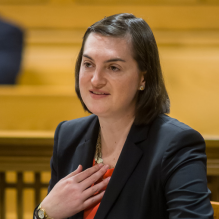Emily Dinsmore’s Testimony

Thank you for inviting me to this hearing. Access to civil legal services is a key component of our justice system, and I’m honored to have the opportunity to share my experiences with you.
SUNY Buffalo Law School, in line with its public interest tradition, has provided many opportunities for students to meet and exceed the pro bono requirement. Through our clinic, practicum and externship programs, my classmates have worked in a variety of agencies, courts and law departments across Western New York and beyond.
This past spring, I participated in the Mediation Clinic. Under the guidance of our professor, Steven Sugarman, five other students and I were able to observe many mediations and court-mandated settlement conferences. In addition to our observations, we were able to co-mediate several small claims disputes, and I co-mediated two custody disputes as well.
This experience was especially meaningful for me because I grew up with the clinical program, so to speak. My mother, Suzanne Tomkins, is a clinical professor here at SUNY Buffalo Law School, and I have spent countless hours stuffing envelopes, staffing tables and running supplies for various events over the years. As such, I grew up with the understanding that my duty as a citizen and community member is to help those in need.
Even with that background, I didn’t always fully grasp the influence my mother’s work was having. Now, however, I see that this school’s clinics really have a two-fold impact on the community. First, and perhaps most obviously, students in the program directly help people in need. I agree with Albert Einstein that “in matters of truth and justice, there is no difference between large and small problems, for issues concerning the treatment of people are all the same.” In my work in small claims court, I saw the palpable differences between persons represented by counsel and those proceeding pro se. Even in a court with a limited scope and relatively relaxed procedure, pro se litigants were at a distinct disadvantage. Forms, procedure and even vocabulary could provide potentially insurmountable hurdles. When we were able to successfully mediate, however, the litigants were able to obtain justice as they defined it and move on with their lives, whether or not they were represented by counsel.
As much as we as students help the community, though, our direct efforts while we’re in law school are only one part of the puzzle. The true impact that we will have is that we will not stop providing pro bono services when we graduate. I’ve spoken to many of my mother’s former students, and each of them has left her clinic with the same message she gave her daughters: that those of us with the ability to help others must do so. As a member of the first class subject to the pro bono requirement, my individual efforts may be but a drop in the bucket. I take comfort, however, in knowing that as each successive group of graduates becomes imbued in the value of service, more and more members of the bar will share this commitment.
In closing, I would like to state that I’m proud to be part of a law school whose administration, led by Dean Mutua, has supported its clinical program and provided its students with so many opportunities to make strides in the community, and I’m proud to be part of a state that has adopted the pro bono requirement advocated by Chief Judge Lippman and the other members of this panel. Thank you again for allowing me to speak before you today.